
The Book of Joshua is the sixth book in the Hebrew Bible and the Old Testament, and is the first book of the Deuteronomistic history, the story of Israel from the conquest of Canaan to the Babylonian exile. It tells of the campaigns of the Israelites in central, southern and northern Canaan, the destruction of their enemies, and the division of the land among the Twelve Tribes, framed by two set-piece speeches, the first by God commanding the conquest of the land, and, at the end, the second by Joshua warning of the need for faithful observance of the Law (torah) revealed to Moses.

Deuteronomy is the fifth book of the Torah, where it is called Devarim and the fifth book of the Hebrew Bible and Christian Old Testament.

Joshua, also known as Yehoshua, Jehoshua, or Josue, functioned as Moses' assistant in the books of Exodus and Numbers, and later succeeded Moses as leader of the Israelite tribes in the Book of Joshua of the Hebrew Bible. His name was Hoshea the son of Nun, of the tribe of Ephraim, but Moses called him "Yehoshua", the name by which he is commonly known in English. According to the Bible, he was born in Egypt prior to the Exodus.

Amalek is described in the Hebrew Bible as the enemy nation of the Israelites. The name "Amalek" can refer to the descendants of Amalek, the grandson of Esau, or anyone who lived in their territories in Canaan, or North African descendants of Ham, the son of Noah.
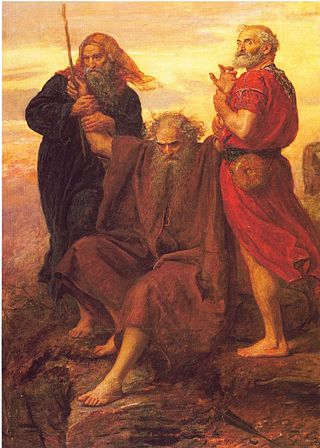
Rephidim or Refidim is one of the places visited by the Israelites in the biblical account of the Exodus from Egypt.

According to the Hebrew Bible, the Kenites/Qenites were a tribe in the ancient Levant. They settled in the towns and cities in the northeastern Negev in an area known as the "Negev of the Kenites" near Arad, and played an important role in the history of ancient Israel. One of the most recognized Kenites is Jethro, Moses's father-in-law, who was a shepherd and a priest in the land of Midian. Certain groups of Kenites settled among the Israelite population, including the descendants of Moses's brother-in-law, although the Kenites descended from Rechab maintained a distinct, nomadic lifestyle for some time.

The Exodus is the founding myth of the Israelites whose narrative is spread over four of the five books of the Pentateuch. The narrative of the Exodus describes a history of Egyptian bondage of the Israelites followed by their exodus from Egypt through a passage in the Red Sea, in pursuit of the Promised Land under the leadership of Moses.
Massah and Meribah are place names found in the Hebrew Bible. The Israelites are said to have travelled through Massah and Meribah during the Exodus, although the continuous list of visited stations in Numbers 33 does not mention this. In Exodus 17:7, Meribah is mentioned at the same time as Massah, in a context which suggests that Massah is the same location as Meribah, but other biblical mentions of Massah and Meribah, such as that in the Blessing of Moses seem to imply that they are distinct. Massah and Meribah are also referred to in several other places in the Bible.

Beshalach, Beshallach, or Beshalah is the sixteenth weekly Torah portion in the annual Jewish cycle of Torah reading and the fourth in the Book of Exodus. It constitutes Exodus 13:17–17:16. In this parashah, Pharaoh changed his mind and chased after the Israelites, trapping them at the Sea of Reeds. God commanded Moses to split the sea, allowing the Israelites to escape, then closed the sea back upon the Egyptian army. The Israelites also experience the miracles of manna and clean water. And the Amalekites attacked, but the Israelites were victorious.
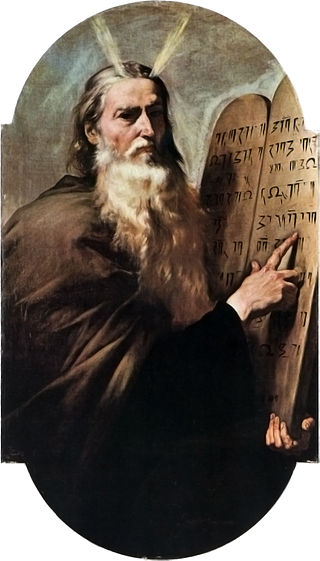
Mosaic authorship is the Judeo-Christian tradition that the Torah, the first five books of the Hebrew Bible/Old Testament, were dictated by God to Moses. The tradition probably began with the legalistic code of the Book of Deuteronomy and was then gradually extended until Moses, as the central character, came to be regarded not just as the mediator of law but as author of both laws and narrative.
"The Bible's Buried Secrets" is a Nova program that first aired on PBS, on November 18, 2008. According to the program's official website: "The film presents the latest archaeological scholarship from the Holy Land to explore the beginnings of modern religion and the origins of the Hebrew Bible, also known as the Old Testament. This archaeological detective story tackles some of the biggest questions in biblical studies: Where did the ancient Israelites come from? Who wrote the Bible, when, and why? How did the worship of one God—the foundation of modern Judaism, Christianity, and Islam—emerge?"
Normative Judaism's views on warfare are defined by restraint that is neither guided by avidness for belligerence nor is it categorically pacifist. Traditionally, self-defense has been the underpinning principle for the sanctioned use of violence, with the maintenance of peace taking precedence over waging war. While the biblical narrative about the conquest of Canaan and the commands related to it have had a deep influence on Western culture, mainstream Jewish traditions throughout history have treated these texts as purely historical or highly conditioned, and in either case not relevant to contemporary life. However, some minor strains of radical Zionism promote aggressive war and justify them with biblical texts.
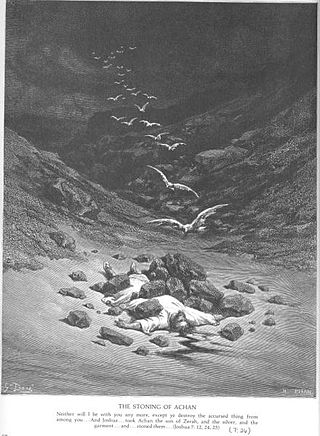
Herem or cherem, as used in the Tanakh, means something given over to the Lord, or under a ban, and sometimes refers to things or persons to be utterly destroyed. The term has been explained in different and sometimes conflicting ways by different scholars. It has been defined as "a mode of secluding, and rendering harmless, anything imperilling the religious life of the nation", or "the total destruction of the enemy and his goods at the conclusion of a campaign", or "uncompromising consecration of property and dedication of the property to God without possibility of recall or redemption". It is translated into Latin as devotio, a word used for human sacrifice, and into Greek as anathema, which was a sacrifice to the gods.

The Hebrew Bible and the New Testament both contain narratives, poems, and instructions which describe, encourage, command, condemn, reward, punish and regulate violent actions by God, individuals, groups, governments, and nation-states. Among the violent acts referred to are war, human sacrifice, animal sacrifice, murder, rape, genocide, and criminal punishment. Violence is defined around four main areas: that which damages the environment, dishonest or oppressive speech, and issues of justice and purity. War is a special category of violence that is addressed in four different ways including pacifism, non-resistance, just war and crusade.
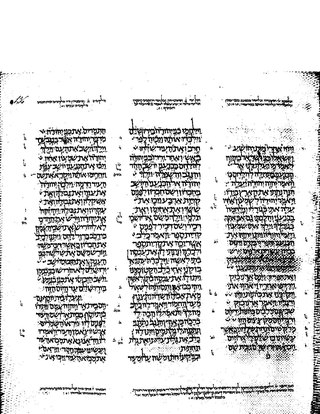
Judges 20 is the twentieth chapter of the Book of Judges in the Old Testament or the Hebrew Bible. According to Jewish tradition the book was attributed to the prophet Samuel, but modern scholars view it as part of the Deuteronomistic History, which spans in the books of Deuteronomy to 2 Kings, attributed to nationalistic and devotedly Yahwistic writers during the time of the reformer Judean king Josiah in 7th century BCE. This chapter records the war between the tribe of Benjamin and the other eleven tribes of Israel, belonging to a section comprising Judges 17 to 21.

Numbers 31 is the 31st chapter of the Book of Numbers, the fourth book of the Pentateuch (Torah), the central part of the Hebrew Bible, a sacred text in Judaism and Christianity. Scholars such as Israel Knohl and Dennis T. Olson name this chapter the War against the Midianites.

Judges 6 is the sixth chapter of the Book of Judges in the Old Testament or the Hebrew Bible. According to Jewish tradition the book was attributed to the prophet Samuel, but modern scholars view it as part of the Deuteronomistic History, which spans in the books of Deuteronomy to 2 Kings, attributed to nationalistic and devotedly Yahwistic writers during the time of the reformer Judean king Josiah in 7th century BCE. This chapter records the activities of judge Gideon, belonging to a section comprising Judges 6 to 9 and a bigger section of Judges 6:1 to 16:31.
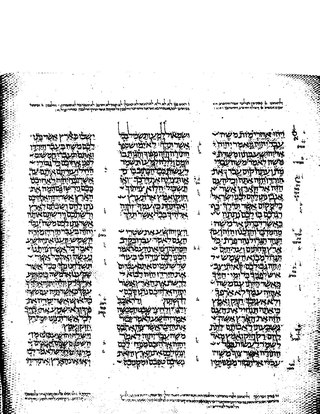
Joshua 1 is the first chapter of the Book of Joshua in the Hebrew Bible or in the Old Testament of the Christian Bible. According to Jewish tradition the book was attributed to Joshua, with additions by the high priests Eleazar and Phinehas, but modern scholars view it as part of the Deuteronomistic History, which spans the books of Deuteronomy to 2 Kings, attributed to nationalistic and devotedly Yahwistic writers during the time of the reformer Judean king Josiah in 7th century BCE. This chapter focuses on the commission of Joshua as the leader of Israel after the death of Moses, a part of a section comprising Joshua 1:1–5:12 about the entry to the land of Canaan.
War in the Hebrew Bible concerns any military engagement narrated or discussed in the Hebrew Bible, also known as the Tanakh or Old Testament of the Bible. Texts about war in the Hebrew Bible are part of the broader topic of The Bible and violence. They cover a wide range of topics from detailed battle reports including weapons and tactics used, numbers of combatants involved, and casualties experienced, to discussions of motives and justifications for war, the sacred and secular aspects of war, descriptions and considerations of what in the modern era would be considered war crimes, such as genocide or wartime sexual violence, and reflections on wars that have happened, or predictions, visions or imaginations of wars that are yet to come.

Joshua 5 is the fifth chapter of the Book of Joshua in the Hebrew Bible or in the Old Testament of the Christian Bible. According to Jewish tradition, the book was attributed to Joshua, with additions by the high priests Eleazar and Phinehas, but modern scholars view it as part of the Deuteronomistic History, which spans the books of Deuteronomy to 2 Kings, attributed to nationalistic and devotedly Yahwistic writers during the time of the reformer Judean king Josiah in 7th century BCE. This chapter focuses on the circumcision and Passover of the Israelites after crossing the Jordan River under the leadership of Joshua, a part of a section comprising Joshua 1:1–5:12 about the entry to the land of Canaan, and the meeting of Joshua with the Commander of the Lord's army near















